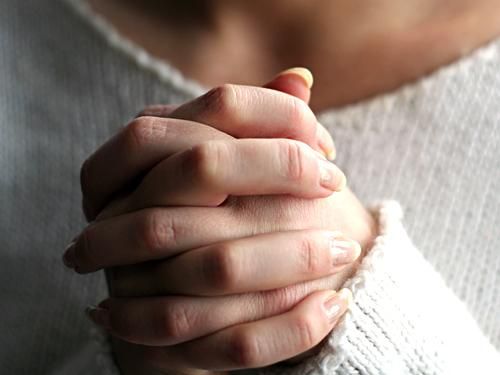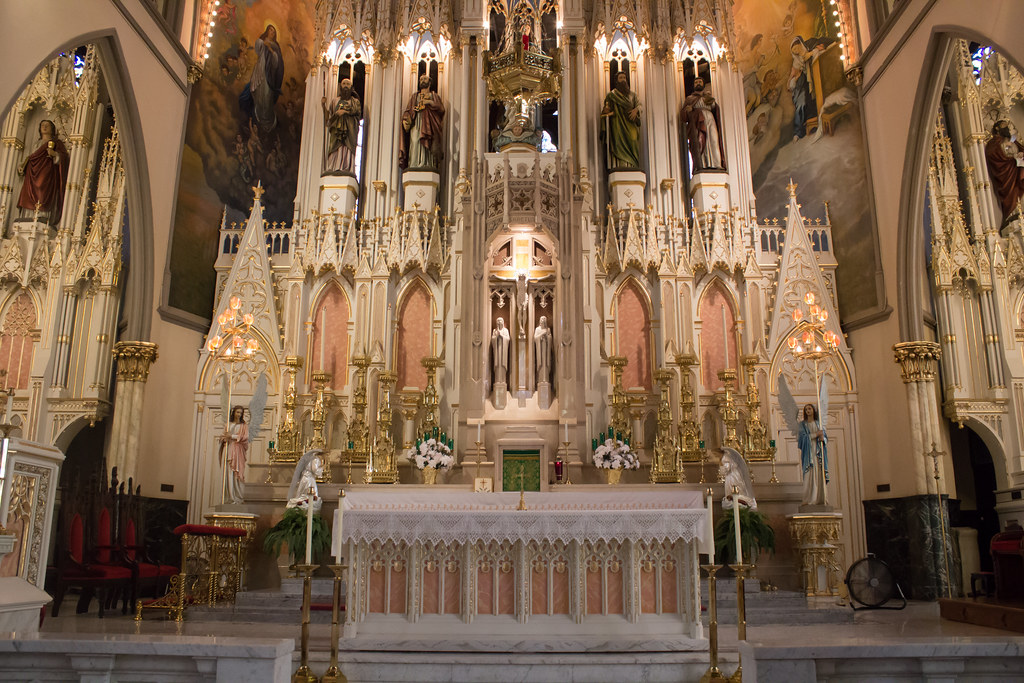9 Tips For Taking Kids to Mass
Oct 02, 2019 by Whitney Hetzel
“Let the children come to me, and do not hinder them; for to such belongs the kingdom of heaven.”
—Matthew 19:14
I have been taking my kids to Mass for about twenty-seven years. In that time, my understanding of what it means to participate in the Holy Sacrifice of the Mass has evolved—probably at the rate that I have matured, both as a parent and as a Catholic.
Looking back now, I realize something: not only have I changed over that period of time, but the way that I approach the Mass with my children has also changed. Sadly, in the past, my focus wasn’t always where it should have been. There were times when I was more concerned with my children’s behavior or attitude or dress than I was about what was going on in their hearts, or in my own heart.
As Christians, our whole life is a journey of faith. We are always learning new things about ourselves through our experiences, and in the process, we are (hopefully) expanding and broadening our knowledge of, and love for, Our Lord. While my own love for the Holy Sacrifice of the Mass has grown over time, I also know that I want that to be the case for my children, as well. I want them to love the Mass, too!
This brings up a question: how do we pass this love along?
[[13840]]
Such a gift comes from God, so first of all, we must do what we can to foster in our children a love for Him. Saint Faustina said, “A humble soul does not trust itself, but places all its confidence in God.” To this end, I have discovered that sometimes, especially as our children grow older, the best thing we can do is to get out of the way.
However, as a parent—who, along with my husband, has brought infants, toddlers, teenagers, and young adults to Mass for many years—I have learned some things that I believe can facilitate a proper sense of worship at Mass.
Some of these things have come from witnessing our own children grow in their love for God through the Mass, and some are lessons that we’ve learned through our mistakes. Other tips have come from observing friends and other parents, and talking to them about what has worked for their family and what hasn’t.
The truth is, most parents deeply desire to pass on to their children a sincere love for God and His Holy Church. There are as many ways to do this as there are parents. Each of us has a unique family, with all sorts of personalities and various circumstances that make our situation different from other families. That being said, the following are a few suggestions I would like to share from my own parenting experience (there are nine of course):
1. Tend to your own faith first.

Children are always watching us. If we are close to God, they will know it. And if we aren’t, they will know that, as well. We can’t fake it. I now understand this in ways I didn’t when I was a young parent.
The saying is true: “We cannot give what we do not have.” At some point, it became clear to me that in order to “teach” my children about God, I had to get to know Him better myself. The best part about this is that, as my relationship with the Lord deepens, so does the love and mercy I show my children.
The Mass is the most important thing we do all week. Do we really believe that? Do we act like it? Our reverence and love for God in the Holy Sacrifice of the Mass will be apparent to our children. So will our lack of reverence.
2. Focus on God’s love and mercy.
When I first became Catholic and my children were very young, I was concerned about their behavior at Mass. Of course, this is a good thing and is still something I work on with my young children, but I learned that it can be emphasized to a fault.
Looking back, I now see that there were times when it would have been better to let certain poor behavior go and spend more time talking to them about God’s goodness and His mercy. While modesty and reverence are very important, I discovered that in certain moments (especially for teens) it was more important that they know that they are loved.
Let’s face it: sometimes, just getting teenagers to Mass can feel like a heroic accomplishment. The good news is that often, as they mature, they begin to see the value in what they were taught.
3. Learn when to say something, and when it’s better to be patient and silent.
This means different things for different people. I have one story that helps to bring it into perspective.
Last spring, there was a closing Mass on the final night of our parish mission. I brought my mom and a few of my children, and we found seats right up front. A few minutes after the Mass began, my college-age daughter came in and walked down the center aisle to squeeze in next to us. That’s when I noticed that she was wearing a skirt that in my “mom opinion” was too short for Mass.
I instantly thought about all the people who had seen her as she walked down the aisle. I began to mentally prepare the speech that I would give to her about what was appropriate to wear to Mass (et cetera, et cetera) as soon as Mass was over. I felt my anger and frustration with her rise up within me, and had a hard time focusing on the Mass.
Finally, during the Prayers of the Faithful, I whispered to God, “Lord, you know her heart. She is older now and I have less control. Teach me to know what to say and when to say it.”
After this prayer and throughout the rest of Mass, I calmed down. I became less conscious of how my daughter was dressed and more aware of what was happening on the altar. Instead of wanting to glare at her during the Sign of Peace, I gave her a hug.
When Mass was over, and we were walking out of the church, I heard my daughter say to my mom, “This is my second time at Mass today. I went this morning, too. But I knew you would all be here, so I decided to come to the last night of the mission with you.”
The speech I had planned for during the first part of the Mass suddenly vanished.
4. Make Sunday Mass a holy and happy experience as much as possible.
When my husband and I were first married, we visited a friend who lived out of town. In the three days that we were there, this friend had some grandparents who were also visiting. Each day, these grandparents took their young grandchildren to daily Mass. I was impressed because the kids seemed excited to go! Curious, I asked the grandmother how she managed to create in the young children an eagerness for going to Mass.
Smiling, she said, “They know that if they come to Mass, they get to stop with Grandma and Grandpa on the way home and get a donut...we make it a treat to go to Mass with us!”
That wise grandmother knew a thing or two about meeting kids right where they are.
Since then, I have tried to remember that when children are young, it is helpful to associate the Mass with something positive. One tradition, which we started a long time ago, is to make a big breakfast after Mass. We still do this whenever we can.
5. Explain a little about the Mass each time you go.
“And these words which I command you this day shall be upon your heart; and you shall teach them diligently to your children, and shall talk of them when you sit in your house, and when you walk by the way, and when you lie down, and when you rise.”
—Deuteronomy 6:6-9I’ll never forget the priest who told my husband and I about a game that he and his family had played on their way home from church. He said that every Sunday, his dad would see who could remember the most about the Gospel reading of the day. All the kids would shout out what they remembered, and he would ask them questions about it all the way home. This now-priest, and his siblings, had been given an added incentive to listen to the gospel and to the homily so that the message could be recalled later on.
[[7763]]
6. Get to Mass early.
We struggled with getting to Mass early for a long time. But over the years I have definitely seen the fruits of doing so. When we arrive early, we can pray in silence for a few minutes, or just sit in the pew and prepare our hearts. The kids have a chance to use the restroom. (One of our sons was famous for turning to us about five minutes into Mass to tell us he had to go!)
The fact is that in all other areas of our kids’ lives—whether it’s school, sports, or any activity they are involved in—they are told that they must be there on time. If we don’t show the same respect to God at the Holy Mass, then what message are we sending to our children?

7. If you have the occasional opportunity to go to a weekday Mass alone, take advantage of it.
As a homeschooling mom, I tried to get to daily Mass whenever possible. I used to think that I always had to take my children with me. Then, one day, I left the house early, went to an exercise class, and drove to Mass, which was just a few minutes away. I remember the feeling of true focus. I listened to each of the readings closely; felt myself lifted up at the Consecration, and even stayed after Mass to light a candle for each of my children, and for my husband as well.
I realized on the way home that I felt recollected in a way that I hadn’t for a long time. I also realized that I needed that alone-time with God.
Sometimes I still slip out early, before anyone is up, and go to an early Mass. Our youngest three are still at home and sometimes one of them will catch me as I’m leaving and come with me. Sometimes we stop for a donut on the way home!
8. Work up to appropriate Mass behavior.
It’s been a long time since I have had little ones at Mass. But I certainly remember walking to the back of the church or to the cry room with a screaming infant or restless toddler.
The same priest who told us about the game his father played on the way home from Mass also gave us some good advice about bringing items for kids into Mass. He said to try to think of adding something for children as they age, not taking something away. In other words, don’t bring something in to Mass (except, of course, a bottle) that will eventually have to be taken away. For instance, your child won’t have Cheerios at Mass as they get older. Instead, he said, bring soft, quiet toys or books—preferably those about the Mass and Jesus—because then you can eventually replace them with Mass books or hymnals.
I thought this was a reasonable goal for kids at Mass. If children are too young to be expected to sit quietly, it’s good to use the cry room and bring the children in as soon as you think they are able.
No one should expect the church to be perfectly quiet on Sundays. There will often be children making children sounds. That’s a good thing. However, if they are so disruptive that they interfere with the worship of those around them, then it’s time to take them out until they quiet down.

9. Recognize that your children are on their own journey of faith.
One of the fruits of a maturing faith is that, as parents, we begin to recognize that our children have their own relationship with God and that they are on their own journey. Sometimes we might feel a sense of failure when our children make mistakes or when they stray from the Faith. Yet our own worthiness is not measured according to how “good” or even how “faithful” our children are. We cannot let the choices they make weaken our own faith. The truth is that when we demonstrate a real faith—one that focuses on loving God—we are reflecting God’s image for our children to see. There is no greater purpose we can have as parents.
Yes, let’s do the best we can to reflect a love for God and for the Holy Sacrifice of the Mass.
We can also remember to offer our children to God each time we come to Mass. After all, He loves our children even more than we do!
This reflection was taken from our Good Catholic series on The Holy Mass. Sign up for this or other series here.
[[14235,12144,7712,12307]]





